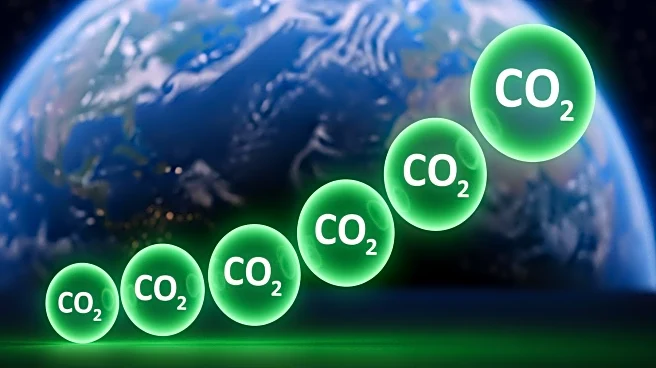What's Happening?
The World Meteorological Organization (WMO) has reported a significant increase in atmospheric carbon dioxide levels in 2024, marking the largest annual rise since modern measurements began in 1957. The global average concentration of CO2 surged by 3.5
parts per million (ppm) to reach 423.9 ppm, surpassing the previous year's increase of 2.3 ppm. This surge is attributed to ongoing fossil fuel emissions, increased emissions from wildfires, and a decrease in carbon uptake by the world's lands and oceans. The WMO warns that the excess CO2 will have a warming effect on the planet for centuries, exacerbating extreme weather conditions. The recent El Niño weather pattern contributed to the reduced carbon absorption, particularly affecting tropical regions like the Amazon, where forest loss doubled compared to the previous year.
Why It's Important?
The record increase in CO2 levels underscores the urgent need for global action to address climate change. The continued rise in greenhouse gases is likely to intensify extreme weather events, impacting ecosystems, economies, and communities worldwide. The decline in the planet's ability to absorb carbon, particularly in tropical and northern hemisphere regions, suggests a weakening of natural carbon sinks, which could further accelerate climate change. This development highlights the critical importance of reducing fossil fuel emissions and implementing sustainable practices to mitigate environmental impacts. Stakeholders, including governments, businesses, and civil society, must prioritize climate policies and investments in renewable energy to curb emissions and enhance carbon sequestration.
What's Next?
The WMO's findings may prompt increased pressure on policymakers to implement stricter regulations on fossil fuel emissions and invest in carbon capture technologies. International climate agreements and collaborations could be strengthened to address the global challenge of rising CO2 levels. Researchers will continue to monitor carbon uptake trends to determine if the observed decline is part of a longer-term pattern. The scientific community may focus on developing innovative solutions to enhance the planet's natural carbon sinks and improve resilience against climate impacts. Public awareness campaigns and educational initiatives could play a role in encouraging sustainable practices and reducing individual carbon footprints.
Beyond the Headlines
The record CO2 increase raises ethical questions about the responsibility of industrialized nations in contributing to climate change and the disproportionate impact on vulnerable communities. Legal frameworks may evolve to hold corporations accountable for their environmental footprint, potentially leading to increased litigation and regulatory scrutiny. Culturally, the growing awareness of climate change could influence consumer behavior, driving demand for eco-friendly products and sustainable lifestyles. Long-term shifts in energy production and consumption patterns may emerge as societies adapt to the realities of a changing climate.
















